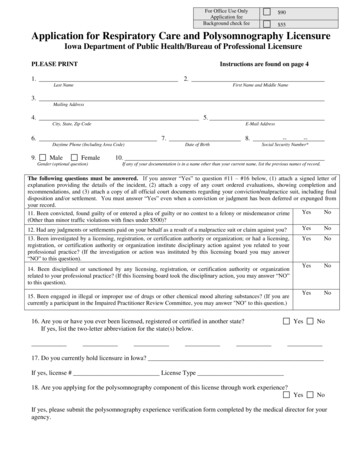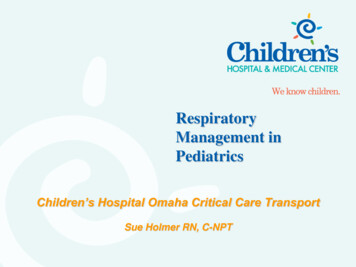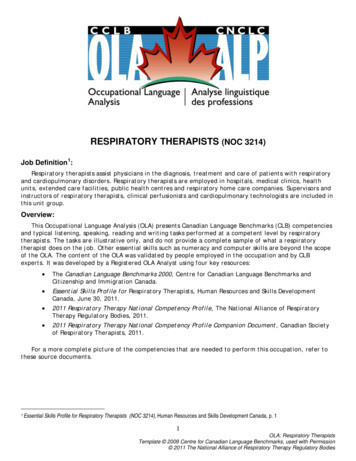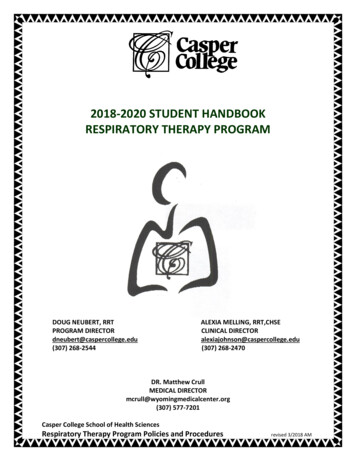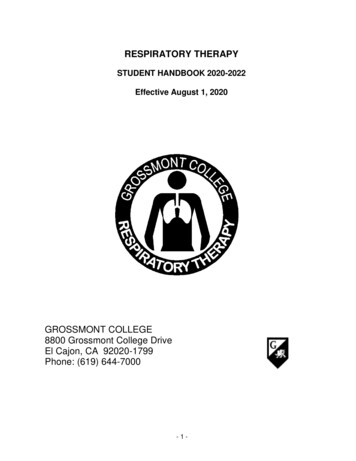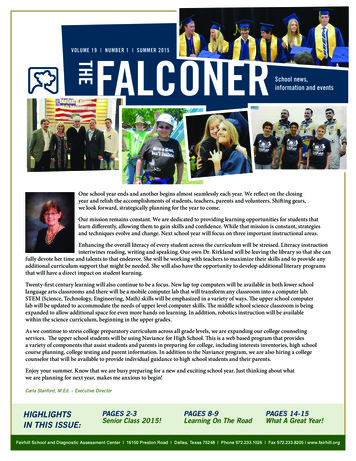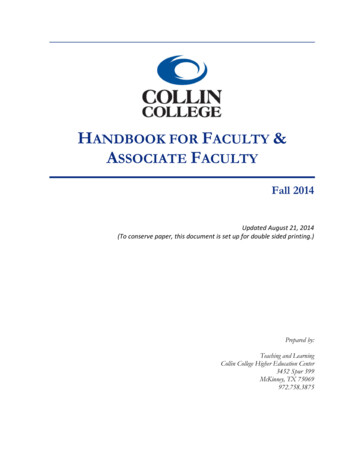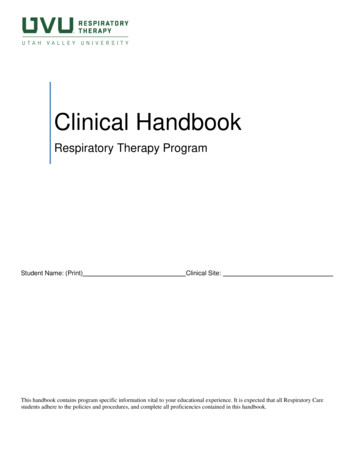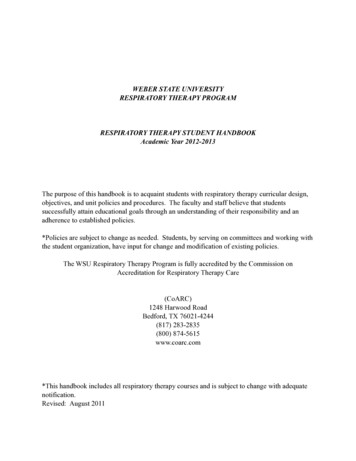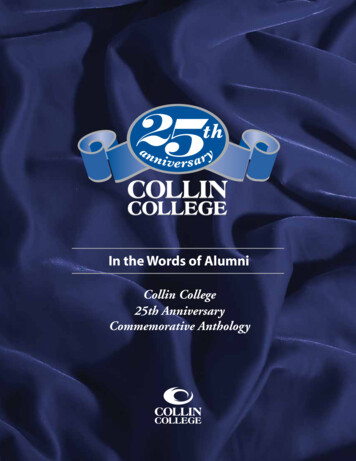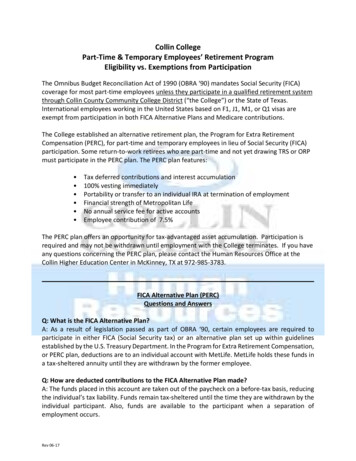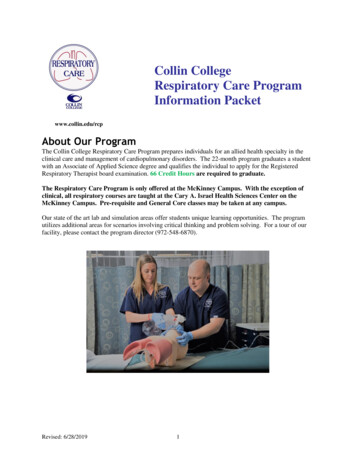
Transcription
Collin CollegeRespiratory Care ProgramInformation Packetwww.collin.edu/rcpAbout Our ProgramThe Collin College Respiratory Care Program prepares individuals for an allied health specialty in theclinical care and management of cardiopulmonary disorders. The 22-month program graduates a studentwith an Associate of Applied Science degree and qualifies the individual to apply for the RegisteredRespiratory Therapist board examination. 66 Credit Hours are required to graduate.The Respiratory Care Program is only offered at the McKinney Campus. With the exception ofclinical, all respiratory courses are taught at the Cary A. Israel Health Sciences Center on theMcKinney Campus. Pre-requisite and General Core classes may be taken at any campus.Our state of the art lab and simulation areas offer students unique learning opportunities. The programutilizes additional areas for scenarios involving critical thinking and problem solving. For a tour of ourfacility, please contact the program director (972-548-6870).Revised: 6/28/20191
Under medical supervision, the RRT is responsible for airway care, ventilator management, and patientmonitoring. In addition to adult critical care, the therapist has a high degree of involvement in therespiratory care of the neonatal and pediatric patient. The therapist also has opportunities for employmentoutside the hospital. He/she can work in home healthcare, long-term care facilities, physician offices,medical equipment sales, and education. Graduates of the therapist program have increased opportunitiesfor employment due to their more extensive level of training. They have more opportunities foradvancement and receive a higher salary.Because the number of applicants typically exceeds space in the program, this program uses acompetitive, criterion-based admission scoring system, which is explained below. A program applicationcan be printed from the “Forms” link on the program website www.collin.edu/rcp.The Respiratory Care Program at Collin College is accredited by the Commission on Accreditation forRespiratory Care (CoARC).Career OpportunitiesThe Respiratory Care Program offers an opportunity to work in the fast-paced and challengingenvironment of critical care medicine. Respiratory Therapists are responsible for airway care, ventilatormanagement, and patient monitoring. In addition to critical care, therapists also work in general careareas providing oxygen therapy, volume augmentation, and aerosol therapy. Respiratory Therapists workin emergency departments, intensive care areas, and even in the transport of critically ill patients. Theearning potential is competitive with equivalent associate degree level programs and career opportunitiesin the health care industry for registered respiratory therapists are rapidly increasing.Graduates of our program are typically employed in the following areas: Adult and Neonatal ICU’s Adult and Pediatric General Care Areas Emergency Departments Long-term Care FacilitiesMinimum PrerequisitesThree out of the four following prerequisites must be completed by the application deadline.A pending prerequisite should be taken in the summer semester prior to starting theprogram.1.2.3.4.Anatomy and Physiology I (BIOL 2401) with a minimum grade “C”.Anatomy and Physiology II (BIOL 2402) with a minimum grade “C”.Microbiology for Health Professions (HPRS 1272) with a minimum grade “C”.*BIOL 2420 will be acceptable.BIOL courses must be taken with 5 years of starting the program.Basic Health Profession Skills (HPRS 1204) with a minimum grade “C”. This has to bewithin 2 years of the first day of class in the fall semester of the admission year.Revised: 6/28/20192
Admission RequirementsApply for admission to Collin College and submit official transcripts from any colleges attendedto the Admissions Office. Please check with the Admissions or Advising Office for questions onspecific requirements.Acceptance into the Respiratory Care Program is selective based on completion of thefollowing procedures:1. Submit a Respiratory Care Program Application to the Respiratory Care Department at theMcKinney Campus no later than the Second Friday in May.2. Submit official transcripts from all colleges attended (including Collin CollegeTranscripts). Transcripts must be mailed to the Respiratory Care Program or sentelectronically to the program director. The Respiratory Care Program must receive alltranscripts by the application deadline. Attention: Araceli Solis, Respiratory Care Program 2200 W. University Drive, McKinney, Texas, 75070If you are new to Collin, the Admissions Office will also need official copies of all collegesattended.3. Become informed about respiratory care and the program: Informed applicants make better candidates, and in an effort to inform thecandidate, the Respiratory Care Program requires that each applicant participate in aRespiratory Care Information Session held periodically at Collin College campuses.Please see the program website for dates. If unable to attend a session, pleaseschedule an appointment with the Program Director prior to the application deadline(972-548-6870).4. Complete the PSB Health Occupations Aptitude Examination. This exam should be takenprior to the application deadline. It may only be taken once in a 12 month period.5.Be in good Academic Standing with a GPA of 2.5 or higher.6. Complete all prerequisite and core courses. Students who have completed all prerequisiteand core classes will have a better chance of being accepted into the program.7.It is highly recommended that any students transferring from another accredited institutionspeak with an Academic Advisor. Each campus has Academic Advisors who can assist you. 972 881-5782 Plano/Spring Creek Campus 972-548-6782 McKinney/Central Park Campus 972 377-1779 Frisco/Preston Ridge Campus.Revised: 6/28/20193
Selective Admission ScoringTotal Points Possible: 48Acceptance into the Respiratory Care Program is competitive and is based on the total number of pointsthat are accumulated in the areas below. Meeting with the program director is encouraged, but does notcarry points in the admission scoring process. The following methods are used to award points in theprocess of evaluating your application. Please note that these criteria are subject to modification and maybe changed without prior notice. In the event that it becomes necessary to modify the criteria, allapplications will be subject to the modification regardless of when the application was submitted.Changes in admission criteria will be published on the program web site.I.Pre-requisites (Maximum Points: 8)BIOL 2401 Anatomy and Physiology IBIOL 2402 Anatomy and Physiology IIHPRS 1272 Microbiology for Health ProfessionsHPRS 1204 Basic Health Profession Skills2 points2 points2 points2 points3 of the 4 pre-requisites should be completed with an end-of-course grade by the end of May of theapplication year. Although the minimum required grade is a “C”, due to the competitiveness of theprogram higher grades are desirable. Courses in progress at the time of the application will be considered.II.Other AAS Core Courses (Maximum Points 4)It is advantageous to complete as many AAS core courses as possible before taking RespiratoryCare course work. Any courses taken at the time of the application will be considered.A.B.C.ENGL 1301 Composition and Rhetoric ISOCI 1301 or PSYC 2301 (Social or Behavioral Science)PHIL 2303 Introduction to Logic (Or Humanities elective)1 point1 point2 points** All other humanities courses substituted for PHIL 2303 will receive 1 pointIII.PSB Exam (Maximum Points: 16)The PSB Health Occupations Aptitude Examination is offered through the Psychological ServicesBureau. This test includes five areas: Academic Aptitude, Spelling, Reading Comprehension,Natural Science, and Vocational Adjustment. The admission scoring based on PSB results are asfollows:Academic Aptitude, Spelling, Vocational Adjustment76%-100%2 points (for eachsection)1 point0 point25% -75%Less than 25 %Reading Comprehension91% -100%76% - 90%51% - 75%25 % - 50%Less than 25%43210Natural SciencesRevised: 6/28/20194PointsPointsPointspointPoint
97% - 100%91% - 96 %75% - 90 %61% - 74 %41% -60%25% - 40%Less than intGrade Point Average (Maximum Points: 10)The cumulative GPA will be calculated based on courses included in the Respiratory Carecurriculum. Points will be given using the following scale:3.763.663.513.363.263.153.002.862.702.50V.- 4.00– 3.75– 3.65- 3.50– 3.35- 3.25– 3.14– 2.99– 2.85– 2.6910 points9 points8 points7 points6 points5 points4 points3 points2 point1 PointRequired Participation in Respiratory Care Information Session (5 Points)The Program Director, Academic Advisor, Respiratory Care professionals and others includingcurrent or former students will be available to give information about the career in general and theprogram in particular. Attendance and participation by the prospective students is consideredvery important. To receive the maximum points for this section, the prospective student must bepresent for the whole session. Students who arrive 10 minutes late to a session will not be givenany points towards admission scoring and will need to attend another session.VI.Bonus Points (Maximum Points: 5.00)Students who have completed these courses with a “B” grade or above are given bonus points.MATH 1314 College Algebra or equivalent (2 points max)SPCH 1311 Fundamentals of Communication (0.25 point)RSPT 1271 Basic Dysrhythmia (0.25 point)Honors: Select BIOL courses: (0.50 max)A Bachelor’s degree or higher (1point)Students with a baccalaureate degree or above from a regionally accredited USCollege/university will be awarded 1 bonus point towards admission.VII.Selection Options Based on Admission Points40 to 48- First preference30 to 39- Second preference26 to 29- Possible alternatesBelow 26- May not qualifyRevised: 6/28/20195
VIII.Notification of AcceptanceApplicants are selected based on the selective admission criteria. The program director andclinical coordinator review and score all applications. The program director will send a letter ofacceptance to the selected applicants via e-mail as soon as all applications have been reviewed.This is usually in early June. Students are notified of additional required documents anddeadlines in their acceptance letter.Other Special Requirements/ InformationCore Performance StandardsPlease refer the Respiratory Care Department’s “Functional Abilities/Core PerformanceStandards” worksheet for a complete list of generally accepted skills that a respiratory therapistmust possess in order to function safely and effectively in a variety of clinical settings (located in“Forms” on the program website). If a student is unable to meet any one of the core performancestandards listed in the Functional Abilities/Core Performance Standards worksheet, the studentmust identify all accommodations required to meet the standards outlined. In some cases,accommodations may be formulated or recommended by the Access Office (Disability Services)by contacting them at (972) 881-5898. Please see the Collin College Catalog for additionalinformation.Collin College complies with the Americans with Disabilities Act by providing reasonableaccommodations for students with documented disabilities. Students with disabilities areencouraged to make an appointment with an Access Advisor prior to applying to the RespiratoryCare program to allow for evaluation.Texas LicenseIn order to work as a respiratory therapist in the state of Texas (after completion of the program),all Respiratory Care Practitioners are required to obtain a permit through the Texas MedicalBoard. If the applicant has a felony or misdemeanor conviction, he/she may not be eligible for apermit. If the applicant desires any additional information, he/she is encouraged to contact theProgram Director at (972) 548-6870. Information may also be found at the Texas Medical Boardwebsite.Criminal Background CheckCriminal background checks will be required of all students prior to entering the Respiratory CareProgram and prior to beginning the clinical component of the program. Please be aware that theState of Texas reserves the right to deny respiratory care license to individuals that have criminalinfractions. For more information, please contact the Respiratory Care Program Director.Drug TestingIt is standard practice for all employers to drug test hospital workers prior to starting work. Sincethe respiratory care student will be in the hospital participating in patient care, all students will bedrug tested prior to the start of the clinical rotation. The respiratory care program may require adrug test during any semester. This is at the expense of students.Personal Health InsuranceStudents are required to carry personal health insurance while in the clinical portion of theRespiratory Care Program. Proof of such insurance needs to be made available to the programdirector prior to clinical rotations. Students should be aware that eligibility for health insuranceon their parent or guardian’s health insurance may require the student be a full time enrolledRevised: 6/28/20196
student. The number of semester credit hours in which a student must be enrolled to beconsidered full time is defined by Collin College. Students should check with the collegeregistrar’s office to see if they qualify as full time students.Immunization RecordsThe Texas Administrative Code (TAC) and the Dallas-Fort Worth Hospital Council FoundationCommunity Standards require that all students in health programs complete requiredimmunizations. Students are required to provide documentation that that they have completed allimmunization requirements. Immunizations for students are based on the current Centers forDisease Control recommendations for health professionals.1. Mumps, Measles, Rubella: 2 vaccinations or titer showing immunity2. Varicella (chicken pox): Vaccination or titer showing immunity3. Tetanus/Diphtheria/Pertussis (within past ten years)4. Influenza: one dose annually during flu season. Exceptions made for medical andreligious reasons must adhere to hospital policies.5. Hepatitis B vaccination is required: vaccination consists of a three dose series over aseven month period. The series must be started before the application deadline and proofmust be included with the completed application packet. A titer showing immunity isalso acceptable.o Proof of first injection with application. Suggest beginning this series inMarch of the application year.o Proof of third injection must be provided to the Respiratory Care officeby September 15 (date subject to change).o Accelerated dosing schedules are available but it is the student’sresponsibility to seek facilities that have this as an option.Students compromise their standing in the program withoutcompletion of their immunizations.6. Hepatitis A series: Highly recommended.7. Negative Tuberculin (TB) Test: Annual requirement- can be either TST or QFT and/ornegative CXR. If history of positive PPD test or having had TB, must providedocumentation of negative CXR or completed treatment.Students with expired TB tests will not be allowed to attend clinical and will receiveunexcused absences until results are submitted. (Students must be aware of theattendance policy for clinical.)8. See the Collin College website regarding Meningitis Vaccination.The costs of these tests and immunizations are the student’s responsibility. Select clinical sitesmay request additional immunization requirements.Information on immunizations can be accessed at the following website:Centers for Disease Control and Prevention 15a1.htmRevised: 6/28/20197
Program CourseworkNOTE: Applicants are encouraged to complete as many AAS core courses as possible prior to beginning their specialtycourses in Respiratory Care (RSPT).Please see the Academic Catalog four course descriptions.Pre-requisitesCoursesNote: Italicized courses represent “AAS core” courses.BIOL 2401Anatomy and Physiology IBIOL 2402Anatomy and Physiology IIHPRS 1272Microbiology for Health ProfessionsHPRS 1204Basic Health Professions SkillsLectureLabhoursHours34341313Total 4Total 312-30-3Total otal otal Hours:CreditHours323311FIRST YEARFirst Semester - FallCoursesNote: Italicized courses represent “AAS core” courses.RSPT 1160Clinical I, Respiratory Care TherapistRSPT 1201Introduction to Respiratory TherapyRSPT 1307Cardiopulmonary Anatomy and PhysiologyRSPT 1410Respiratory Care Procedures ISecond Semester - springCoursesNote: Italicized courses represent “AAS core” courses.RSPT 1361Clinical II, Respiratory Care TherapistRSPT 1411Respiratory Care Procedures IIRSPT 2217Respiratory Care PharmacologyRSPT 2310Cardiopulmonary DiseaseAny Humanities/Fine Arts General Education OptionThird Semester - summerCoursesNote: Italicized courses represent “AAS core” courses.RSPT 2471Respiratory Care Procedures IIIRSPT 1362Clinical III, Respiratory Care TherapistSECOND YEARFirst Semester - FallCoursesNote: Italicized courses represent “AAS core” courses.PSYC 2301General PsychologyRSPT 2255Critical Care MonitoringRSPT 2353Neonatal/Pediatric Cardiopulmonary CareRSPT 2360Clinical IV, Respiratory Care TherapistRevised: 6/28/20198
Second Semester - SpringCoursesNote: Italicized courses represent “AAS core” courses.RSPT 2130Respiratory Care Exam PreparationRSPT 2139Advanced Cardiac Life SupportRSPT 2231Clinical Simulations in Respiratory CareRSPT 2147Specialties in Respiratory CareRSPT 2361Clinical V, Respiratory Therapy Technician (Capstone)LectureLabhoursHours11031411016Total Hours:GRAND TOTALCreditHours112131266The student is required to receive a grade of “C” or better in all prerequisite and respiratorycoursework. The minimum grade required in all respiratory care courses is 75% or more in orderfor students to progress in the program.Class TimesPlease note: The exact time schedule for the Respiratory Care Program differs each semester.Fall Semester First YearFirst Eight Weeks:Monday and WednesdayTuesday and ThursdayMonday or Wednesday08:00 AM – 11:30 AM08:00 AM – 1:30 PM12:00 PM – 4:00 PMSecond Eight Weeks:Monday and WednesdayTuesday and Thursday (Clinical)Monday or Wednesday:08:00 AM – 11:30 AM07:00 AM – 2:00 PM12:00 PM – 4:00 PMSpring Semester First YearMonday and WednesdayTuesday and Thursday (clinical)Monday or Wednesday08:00 AM – 11:20 AM07:00 AM – 3:00 PM12:00 PM – 4:00 PMSummerMonday and Wednesday, and FridayTuesday and Thursday07:00 AM – 3:00 PM09:00 AM – 4:00 PMFall Semester Second YearMonday and Wednesday (clinical)Tuesday and Thursday07:00 AM – 3:00 PM09:00 AM – 4:00 PMSpring Semester Second YearMonday and Wednesday (clinical)Tuesday and Thursday07:00 AM – 3:00 PM09:00 AM – 4:30 PMThese times are tentative and are subject to change. Times for clinical rotations may differ dependingon the hospital. Students should check the semester schedule online for current times and days.Revised: 6/28/20199
Estimated Costs:The following are approximate costs to be anticipated for theRespiratory Care Program*TuitionLab FeesBooksUniformsLiability InsuranceMedical InsuranceStethoscopeState LicenseSuppliesCredentialing ExamsSee Current ScheduleFirst Year/Second YearEach FallDuring all Clinical TrainingFirst SemesterEnd of Second YearClinical suppliesEnd of School Year 3564** 140 600/ 350 80- 100 30/yearPlease obtain quote 40.00- 150.00 125 90 150 and 200*Tuition is based on credit hours and residency classification and is subject to change uponapproval of the Collin College Board of Trustees.** In-District Estimate 2019-2020Scholarships opportunities are available through the Collin CollegeFoundation.PSB Exam InformationRegister early! Spaces are limited. Students may take the PSB for the Respiratory Care Programonce in a 12-month period. PSB results are good for one year. See the program website foravailable test dates.Steps to Schedule the exam:1. Pay the cashier (Room D118R-McKinney Campus) a 45 non-refundable test fee. Please make sure your nameis correct on your receipt. You will need this receipt inorder to sign up for the exam.2. Reserve your testing date in the Health SciencesDivision Office (H201 at the McKinney Campus/HealthSciences Building). Hours: M-F 8am to 5pm. You willreceive an information packet at this time.3. The test will be administered at the Collin CollegeMcKinney Campus in Room A202 (main building). Pleasehave your student ID or Driver’s License and bring apencil.4. Please allow three hours to complete the exam.Instructions will be provided at the start of the exam.Revised: 6/28/201910
5. If you miss the exam, you will need to re-register andresubmit the 45 registration fee. The fee cannot transferto another exam date after the test is given. Please plancarefully as there is no refund.Sources of Additional InformationInformation concerning a career in respiratory care is available from:American Association for Respiratory Carehttp://www.aarc.org9425 N. MacArthur Blvd. Suite 100Irving, TX 75063-4706, USA(972) 243-2272Information on gaining credentials as a respiratory therapy practitioner can be obtained from:The National Board for Respiratory Care, Inc.www.nbrc.org18000 W. 105th StreetOlathe, KS 66061(913) 895-4900For the current list of CoARC-accredited respiratory care programs:Commission on Accreditation for Respiratory Carewww.coarc.com777 Cannon DriveHurst, TX 76054(817) 283-2235For any information pertaining to the program:Director of Respiratory Care Program2200 W. University Drive Office H207McKinney, TX 75070(972) 548-6870Additional ProgramsCRT-RRT Transition Program/Advanced PlacementThe College offers a transition program to allow those with a CRT credential from the NBRC,who graduated from a one year CRT program and have a minimum of one-year recent experienceto enter the program. Transcripts would need to be evaluated by the program director andacademic advisor. Transition students are required to complete all 2nd year coursework.Graduates are awarded an AAS in Respiratory Care after completion of 1) all 2nd year respiratorycare coursework and 2) completion of the following general core courses:BIOL 2401Revised: 6/28/2019Anatomy and Physiology I11
BIOL 2402ENGL 1301HPRS 1272PSYC 2301HUMA 1301Anatomy and Physiology IIComposition and Rhetoric IMicrobiology or equivalentGeneral Psychology or SOCI 1301Or any Fine Arts/Humanities optionThese courses may be transferred in from other institutions provided; the Anatomy andPhysiology courses are sophomore level courses and must be taken within the past five years.Official transcripts must be sent to the program director for evaluation. The program director andan academic advisor will review all courses to be considered for the curriculum.All applicants to the transition program are also required to demonstrate competency bysatisfactory completion of an entry-level exam. There are two acceptable examinations: 1) theTherapist Multiple Choice (TMC) Exam offered by the National Board for Respiratory Caretaken within the past twelve months- with score above the low cut score, or 2) a secured TMCSelf-Assessment Exam offered by Applied Measurement Professionals (AMP). Please contact theprogram director to discuss these options.Transfer Students from Another Accredited Program:The Program Director reserves the right to accept transfer students. When a transferstudent is being considered for entry into the Collin College program the followingprocedure is necessary:1. Meet the admission requirements of the College.2. Meet the program admission requirements (see page 2)3. Send the official transcripts of all college work to the AdmissionsOffice AND to the Program Director.4. Meet with the academic advisor to evaluate transcripts for generalcourses.5. Send the catalog and course descriptions of the student’s currentrespiratory care program to the program director. Syllabi may berequested.6. Send a letter of recommendation and current status from the student’scurrent program director and one faculty member. Student must be ingood academic standing.Upon receipt of all of the above, the program director with the help of the academicadvisor will develop a degree plan for the student. All of the requirements of regularadmission to the program are applicable to the transfer students. Be advised that,transferring students may have to repeat courses that they might have taken before inorder to be equal with the Collin College program standards. Determining transferequivalency can be a lengthy process. It is the student’s responsibility to provide all therequested information to the program director in a timely manner.Revised: 6/28/201912
The Collin College Respiratory Care Program prepares individuals for an allied health specialty in the clinical care and management of cardiopulmonary disorders. The 22-month program graduates a student with an Associate of Applied Science degree and qualifies the individual to apply for the Registered Respiratory Therapist board examination.
